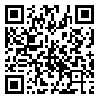Volume 17, Issue 11 (February 2020)
Nursing and Midwifery Journal 2020, 17(11): 871-877 |
Back to browse issues page
Download citation:
BibTeX | RIS | EndNote | Medlars | ProCite | Reference Manager | RefWorks
Send citation to:



BibTeX | RIS | EndNote | Medlars | ProCite | Reference Manager | RefWorks
Send citation to:
javadi M, maghsoudi Z, Rastegarmoghadam R, shahedi M, Kazeminasab M, Mezerji M. THE RELATIONSHIP BETWEEN SELF-CARE AND EMOTIONAL DISTRESS IN PATIENTS WITH TYPE 2 DIABETES REFERRED TO THE YAZD DIABETES RESEARCH CENTER IN 2018. Nursing and Midwifery Journal 2020; 17 (11) :871-877
URL: http://unmf.umsu.ac.ir/article-1-3982-en.html
URL: http://unmf.umsu.ac.ir/article-1-3982-en.html
Mostafa Javadi1 

 , Zahra Maghsoudi *2
, Zahra Maghsoudi *2 

 , Razieh Rastegarmoghadam3
, Razieh Rastegarmoghadam3 

 , Mohammad Shahedi3
, Mohammad Shahedi3 

 , Mahmood Kazeminasab3
, Mahmood Kazeminasab3 

 , Mohammad Mezerji4
, Mohammad Mezerji4 




 , Zahra Maghsoudi *2
, Zahra Maghsoudi *2 

 , Razieh Rastegarmoghadam3
, Razieh Rastegarmoghadam3 

 , Mohammad Shahedi3
, Mohammad Shahedi3 

 , Mahmood Kazeminasab3
, Mahmood Kazeminasab3 

 , Mohammad Mezerji4
, Mohammad Mezerji4 


1- Nursing Midwifery
2- Nursing Midwifery ,maghsoudi.zahra89@gmail.com
3- yazd university
4- Hamadan University of Medical Sciences
2- Nursing Midwifery ,
3- yazd university
4- Hamadan University of Medical Sciences
Abstract: (3987 Views)
Background & Aims: Diabetes is the most common metabolic disease in the world, and self-care is one of the main strategies for controlling the disease. Several studies point to the lack of optimal self-care in diabetic patients as psychological barriers, and emotional distress seems to be one of the factors affecting it. Therefore, this study was conducted to determine the relationship between self-care and emotional distress in patients with type 2 diabetes.
Materials & Methods: In this descriptive cross-sectional study, 380 patients with type 2 diabetes were selected from among those referring to Yazd Diabetes Research Center in 2018. A demographic questionnaire, an emotional distress questionnaire, and a self-care questionnaire for diabetic patients were utilized for gathering data. The collected data were analyzed by SPSS software version 21, and descriptive statistics and Pearson correlation coefficient were utilized.
Results: The results showed that the mean score of self-care patients was 56.65 ± 13.13 and the mean score of emotional distress was 40.82 ± 15.15. Therefore, self-care and emotional distress were moderate in most patients. Based on the Pearson correlation coefficient, there was a negative correlation between self-care score and emotional distress in diabetic patients (r = -0.25, p = 0.01).
Conclusion: Reducing emotional distress is one of the factors affecting the improvement of patients' self-care behaviors, therefore it is necessary to pay attention to it in educational and counseling programs to prevent complications of diabetes and to increase the self-care behaviors of patients.
Send email to the article author
| Rights and permissions | |
 |
This work is licensed under a Creative Commons Attribution-NonCommercial 4.0 International License. |



 gmail.com, unmf
gmail.com, unmf